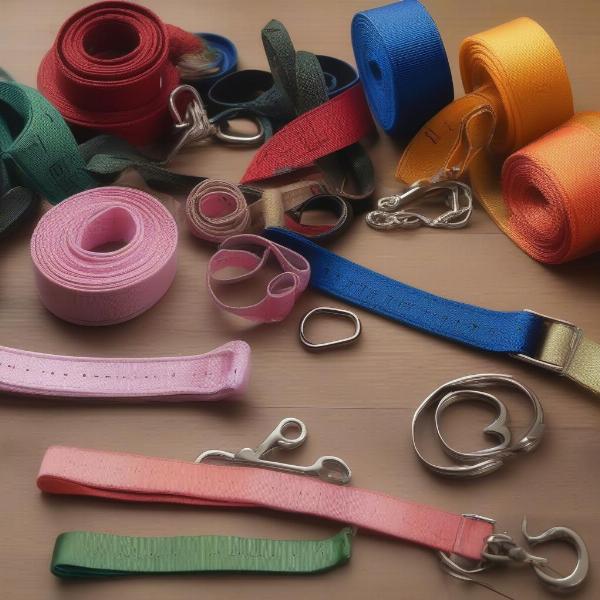Creating a personalized collar for your canine companion is a rewarding experience. Whether you’re aiming for a stylish statement, a durable everyday collar, or a special piece for training, having the right dog collar making supplies is essential. This guide provides a comprehensive overview of everything you need, from basic materials to specialized tools, ensuring you’re well-equipped for your collar crafting journey.
Essential Materials for Dog Collar Making
The foundation of any great dog collar lies in the quality of its materials. Choosing durable and dog-friendly options ensures your finished product is both safe and stylish.
- Webbing: Nylon webbing is a popular choice for its strength, durability, and resistance to water and wear. Consider the width based on your dog’s size and intended use of the collar. Biothane is another great option, known for its waterproof and odor-resistant qualities.
- Hardware: Buckles, D-rings, and adjusters are crucial hardware components. Opt for solid metal like stainless steel or brass for longevity and resistance to rust. Ensure they are appropriately sized for the webbing width.
- Thread: Strong, UV-resistant nylon or polyester thread is essential for secure stitching. Choose a color that complements your webbing or creates an attractive contrast.
 Dog Collar Making Materials
Dog Collar Making Materials
Tools to Empower Your Collar Crafting
Having the right tools makes the process of crafting a dog collar smoother and more efficient.
- Scissors or Rotary Cutter: Sharp scissors or a rotary cutter are essential for clean cuts of webbing.
- Measuring Tape or Ruler: Accurate measurements are crucial for a well-fitting collar.
- Lighter or Fray Check: Sealing the ends of the webbing prevents fraying and ensures a professional finish.
- Sewing Machine (Optional but Recommended): While hand-stitching is possible, a sewing machine significantly speeds up the process and creates stronger, more consistent stitches.
- Leather Hole Punch (if using leather): This tool makes clean and evenly spaced holes for buckles and adjusters in leather collars.
Choosing the Right Supplies for Different Collar Types
The type of collar you’re making will influence the supplies you need.
Everyday Collars
For everyday wear, focus on durability and comfort. Nylon webbing, strong hardware, and a basic buckle closure are ideal.
Training Collars
Training collars may require specialized hardware like martingale rings or quick-release buckles. Wider webbing is also recommended for better control.
Decorative Collars
Get creative with decorative collars! Explore different colors and patterns of webbing, add embellishments like ribbon or studs, and consider using unique closures.
Tips for Successful Dog Collar Making
- Measure Twice, Cut Once: Accurate measurements are vital. Measure your dog’s neck carefully and add extra length for adjustments.
- Test Your Hardware: Ensure buckles and D-rings function smoothly before attaching them to the webbing.
- Reinforce Stress Points: Double stitching or using rivets at stress points like buckle attachments adds extra strength and durability.
- Consider Your Dog’s Comfort: Choose soft, non-irritating materials, especially for dogs with sensitive skin.
Conclusion
Making your own dog collar is a fulfilling project that allows you to personalize your dog’s accessories while ensuring their safety and comfort. With the right dog collar making supplies and a little patience, you can create a unique and durable collar that you and your furry friend will love. Now that you have the knowledge, gather your supplies and start creating!
FAQ
- What is the best material for a dog collar? Nylon webbing and Biothane are popular choices for their durability and water resistance.
- Do I need a sewing machine to make a dog collar? While a sewing machine is recommended for stronger and faster stitching, hand-stitching is also possible.
- How do I measure my dog for a collar? Measure around your dog’s neck where the collar typically sits and add a few inches for adjustments.
- Where can I find dog collar making supplies? Craft stores, online retailers, and specialty pet supply stores often carry these materials.
- What type of hardware is best for dog collars? Stainless steel or brass hardware is recommended for its durability and rust resistance.
- Can I add embellishments to my dog’s collar? Yes, you can add decorative elements like ribbon, studs, or embroidery, ensuring they are securely attached and dog-safe.
- How do I prevent the webbing from fraying? Use a lighter or fray check to seal the cut edges of the webbing.
ILM Dog is your trusted source for comprehensive information on dog care and wellbeing. We offer expert advice on everything from breed selection and health care to training and nutrition. From puppy care to senior dog needs, we’re here to help you every step of the way. Contact us at [email protected] or +44 20-3965-8624. ILM Dog is dedicated to providing dog owners with the resources they need to provide the best possible care for their canine companions.